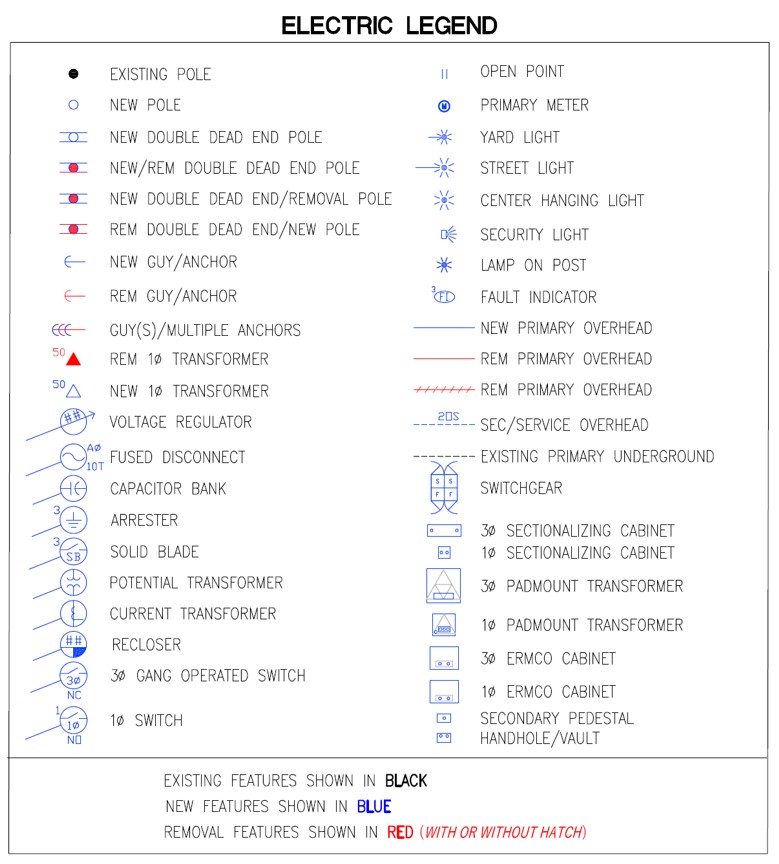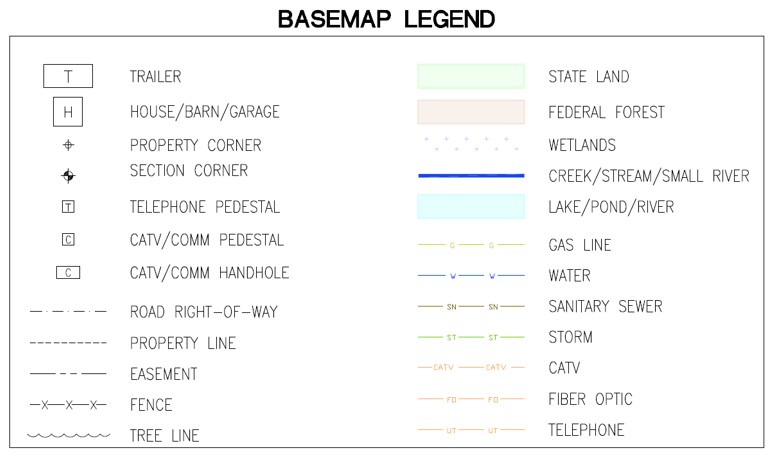FAQ
Welcome to Great Lakes Energy’s FREQUENTLY ASKED QUESTIONS page. Have questions for us not listed here? Email us at [email protected] or call 888-GTLAKES (888-485-2537). Call center hours are 7:00 a.m. – 5:30 p.m.
Have questions for us not listed here? Email us at [email protected] or call 888-GTLAKES (888-485-2537).
Call center hours are 7:00 a.m. – 5:30 p.m.
2024 Rate Adjustments
It is below both the state-wide average price for residential electricity (16.07 cents/kWh in Michigan) and the national average (15.93 cents/ kWh). Averages are based on October 2023 figures provided by the U.S. Energy Information Administration.
The rate changes were developed after a rate analysis performed in conjunction with third-party utility experts using established, well-accepted industry methods. The analysis, which included looking at the 2022 cost-of-service study, showed that Great Lakes Energy’s rates needed to increase due to increased expenses and cost pressures.
We first established a projection for 2024 operating expenses, adding necessary margins for financial health. Our third party then used the 2022 cost-of-service study and their rate analysis to contrast against the 2024 projection, identifying gaps produced by inflation and rising electric generation and transmission costs. A series of top-to-bottom rate designs were then created and evaluated before arriving on the final model being proposed.
Throughout this process, the key factors used to determine a successful rate adjustment for our members were: maintaining affordability, the adjustments must be easily understandable, the rates must be able to remain stable, ensure the adjustments are cost-based, and fair. We also are continuing to shift our fixed costs into the monthly charge and away from the variable energy charge, which is why there is an increase of $5 to the monthly charge. This type of rate structure allows us to get closer to the actual cost to serve each member with electricity (the fixed costs) and allows for the energy charge (kWh) to be variable and based on personal choices.
The kWh rate for residential and seasonal members will increase by $0.02202 per kWh and the fixed monthly charge would increase by $5.00. The power supply cost recovery factor will decrease by $0.01687 per kWh resulting in a net kWh rate increase of $0.00514.
For the average residential member using 800 kWh per month, these changes equate to a $9.48 monthly increase. The average residential/seasonal member who uses 300 kWh/month would pay an additional $6.81 a month.

The GLE board of directors approved these rate adjustments in November 2023. Members will see these changes beginning with their February 2024 bill.
Rising power supply costs and inflation are affecting our costs to provide service. The increase, although small, would raise revenues to provide sufficient funding levels for maintaining reliable electric service, providing adequate margins, and ensuring members receive the service they need to power their homes and businesses.
Material cost increases that are impacting our daily expenses are shown below.
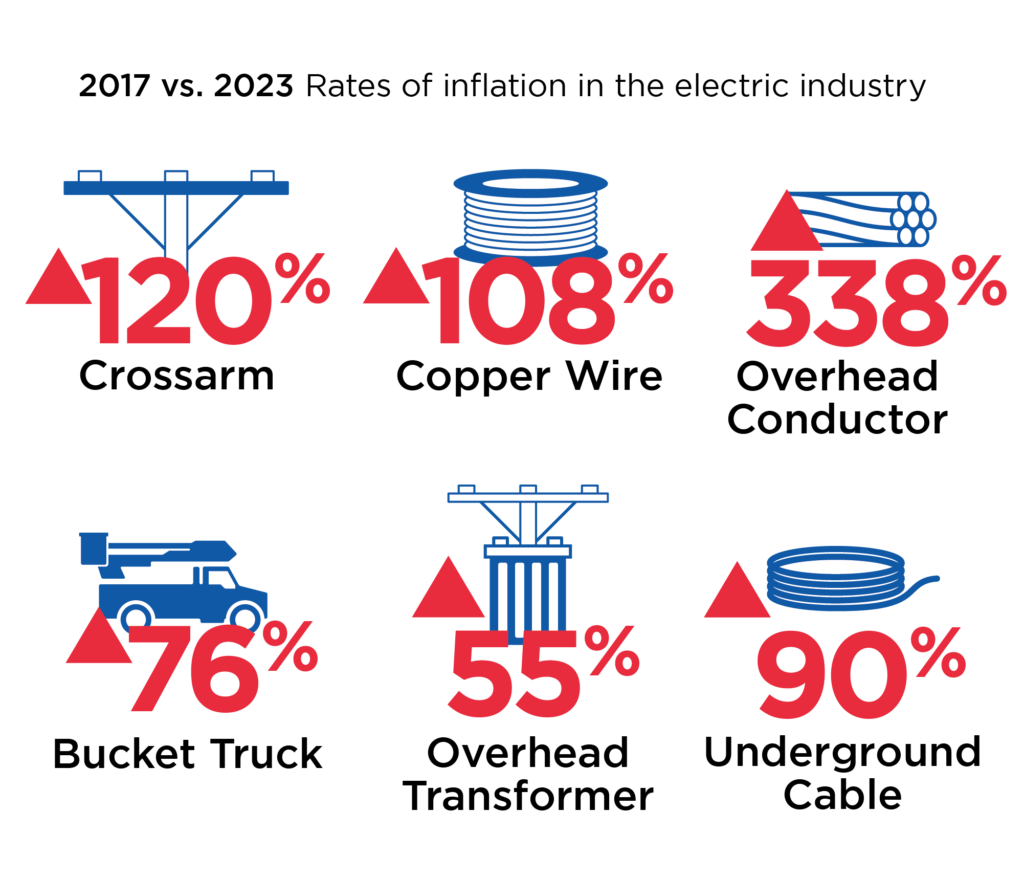
The fixed monthly charge covers the cooperative’s routine operating expenses not tied to your electric consumption. It covers the cost of keeping the cooperative and its distribution system operating and ready to provide service to its members around the clock.
Here’s a closer look at some of the costs the monthly charge covers:
- Operations and maintenance:The biggest share of the monthly charge covers the cost of installing and maintaining poles, wires, transformers, and other distribution system equipment. Also included in this category is the cost of regular tree trimming and other system reliability work, along with the associated transportation costs. Serving more than 126,000 members across 26 counties, GLE is one of the largest electric cooperatives in the country.
- Support services: In addition to costs associated with accounting, metering, and billing, GLE operates eight local offices. These offices allow us to provide service to our members and to respond to outages quickly. There are many labor, equipment, supply, and other fixed costs tied to operating these offices. GLE also maintains a 24-hour emergency dispatch center to coordinate both regular service work and outage restoration efforts.
- Capital costs: GLE also incurs costs such as depreciation on equipment, interest on long-term loans, insurance, taxes, and other normal business expenses.
- Margins: Although GLE is a not-for-profit organization, to ensure the company’s long-term financial stability, it’s important for its income to exceed its costs. The cooperative uses the excess, known as margin, as a cushion against unexpected costs and to prepare for future system investments. When financial conditions allow, GLE returns margins to its members in the form of capital credits.
As costs rise in the categories listed above, the monthly charge will increase to cover those costs allowing GLE to continue providing reliable service.
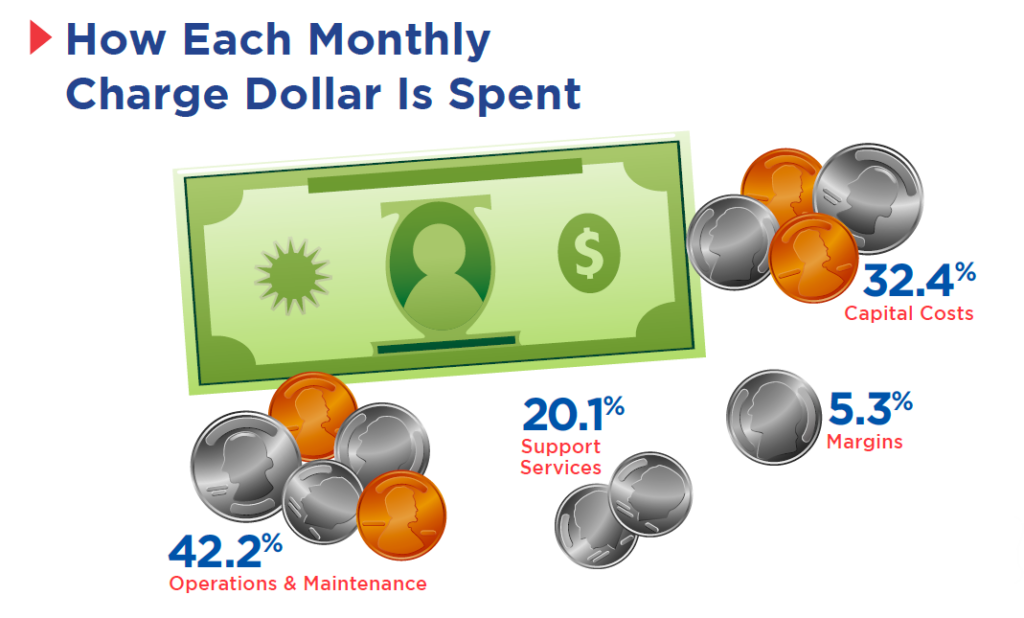
Great Lakes Energy’s rates are regulated by the board of directors who you elect to represent members of the cooperative. Members elect a board member from their district every three years. Members do not vote on decisions or rate increases, but rather their elected board members make these decisions similar to our state and federal legislature.
The open member meeting held on Nov. 21, 2023, allowed time for members to provide feedback and suggestions ahead of the board’s vote. members to provide feedback and suggestions ahead of the board’s vote.
Billing & Rates
What is the PSCR monthly charge on my bill?
- Power supply costs are included in your base rate. However, due to the fluctuation of costs for fuel used to produce power, your co-op’s power supply costs also fluctuate. The Power Supply Cost Recovery charge helps us collect or return revenue outside of what you pay in your base rate to cover those changing costs.
What is the $39.21 MONTHLY CHARGE and what does it cover?
Visit the Account Information page for more information.
What are the WAYS I CAN PAY MY BILL?
Great Lakes Energy offers several convenient Pay Your Way options for paying your electric bill.
What billing and payment options are available to me?
- To set up an online account–which gives you access to options such as viewing your bill, seeing your usage history, reporting and outage or making a payment online, among others–go to gtlakes.com and click on My Account near the top of the screen. Create your username and password.
- Want paperless billing? If so, sign up for it by logging into your account and enrolling in paperless billing. If you do not enroll in paperless billing, you will continue to receive mailed paper bills.
- Do you prefer to pay through your bank’s online payment service? When setting that up with your bank, please record your full account number as it appears on your bill and list the payee as Great Lakes Energy Cooperative. If your account number changes for any reason, please verify the new account number and change it in your bank’s bill payment information.
- Do you want to make payments on multiple accounts through your bank’s online payment service? Please call us at 1-888-485-2537 for additional information on how to set those accounts up in your bank’s online system to ensure payments get credited to the proper account.
- To use the GLE mobile app, download the most recent app by visiting the app store. You must have an online account in order to use the app. Use it to report outages or service issues or to access information from your GLE online account.
- Prefer to receive mailed paper bills and mail or deliver your payments to GLE? You don’t have to do a thing. GLE automatically mails bills to you unless you enroll in paperless billing.
For more payment options visit Pay Your Way.
How long do you hold my DEPOSIT and how do I get it back?
Deposits are held for 12 months. GLE then reviews the account. If there has not been a late payment in that 12 months, the deposit is refunded as a credit on your bill.
Does GLE offers seniors a SPECIAL RATE?
Great Lakes Energy does not offer any special rates. GLE is a cooperative, meaning every member is treated equal, has equal voting rights, and pays the same rate as others in the same rate classification. Seniors with limited income should find out if they qualify for one or more payment assistance programs available.
Can I have my METER TEMPORARILY DISCONNECTED while I am on vacation or gone for a period of time?
Yes. Please note, however, that if the meter is inactive for less than 12 months, monthly charges will be back-billed and a reconnect fee of $40 will be charged. Monthly fees are back-billed to cover GLE’s cost of maintaining lines and equipment for a location whether or not it is in use. (For further information on the monthly charge, visit the Account Information page.) If a meter is inactive for more than 12 months, an inspection by the county is required upon reconnect and the $40 reconnect fee will be charged.
Who do I contact for additional help with questions on my bill or payment options?
Contact us at 1-888-485-2537 or [email protected] with any questions. Call center hours are 7:00 a.m. – 5:30 p.m.
My bill has a SURCHARGE labeled, “MI LOW INCOME ENERGY FUND”. What is that?
The MI Low Income Energy Fund was established by the Michigan legislature as a long-term solution to assist low-income, at-risk residents with their utility bills. The intention is to provide funds to prevent disconnection of service and to help people become more energy self-sufficient. The program is funded by Michigan electric consumers with a line item on their utility bill. All GLE members will see the surcharge on their bill.
How much is this surcharge?
The surcharge amount is adjusted each September by the State of Michigan and cannot exceed $1 per month.
Is Great Lakes Energy required by law to collect this surcharge?
Michigan electric utilities have the option of not collecting this surcharge. However, utilities that choose not to participate in the program would be subject to the following:
- Their ability to implement normal collection procedures to handle delinquent accounts during the heating season of Nov. 1 – April 1 would be limited.
- Qualifying low-income families they serve would be put at risk of not being able to obtain the Energy Fund assistance they need to get through the next heating season.
I have more than one meter. Do I pay the surcharge for each meter?
You pay only one monthly surcharge if the meters all have the same service address. The intent is to apply the surcharge to each metered account unless there are two meters at the same residential site.
Is my money going to help someone in my community?
The intent is that funds collected from our members will only be distributed within our service area. The state’s plan is to collect money from our members and distribute it according to state guidelines within our service area.
How will your decision to participate in the surcharge program affect members whose accounts become delinquent in the upcoming heating season?
We will follow our normal collection procedures, which include the last resort measure of disconnecting accounts for nonpayment if necessary. Members should contact us immediately if they have a past due balance on their account. We will work with them to help them avoid disconnection of service. Qualifying members, including those age 65 and older, can avoid shutoff during the heating season by enrolling in the state Winter Protection Plan.
Who should I contact for MORE INFORMATION ON THIS SURCHARGE?
Please contact your local state representative or senator. Visit Michigan.gov for more information.
About AutoPay
How does AutoPay by checking or savings account work?
Payments can be made by automatic withdrawal from your checking, savings, debit or credit account. To use this method, call our office at 888-485-2537.
How will I know the amount of my bill?
You will still receive a Great Lakes Energy billing statement (at least 10 days before it is due).
What if I have a question about my bill?
As always, call us at 888-485-2537.
How do I know the bill has been paid?
Each payment will be clearly itemized on your next GLE billing statement and financial institution account statement. You can also monitor your account 24/7 by setting up your online GLE account on our website, gtlakes.com.
Can payments be withdrawn from a savings account?
Yes. However, federal regulations limit the number of transactions on some accounts. Contact your financial institution for information about your specific account.
Is there a charge for automatic payment through my checking or savings account?
No, we do not charge for this service. In fact, it’s the most cost-effective way for us to receive payments. Most financial institutions don’t charge either. Remember, they save time and money, too!
What if I change financial institutions?
You will need to complete a new enrollment form and allow up to 30 days for the change to go into effect. If you decide to cancel your participation in the plan, simply give us a call.
Payment Assistance
Where can I get HELP WITH PAYING my bill?
Find information here.
My bill has a SURCHARGE labeled, “MI LOW INCOME ENERGY FUND”. What is that?
The MI Low Income Energy Fund was established by the Michigan legislature as a long-term solution to assist low-income, at-risk residents with their utility bills. The intention is to provide funds to prevent disconnection of service and to help people become more energy self-sufficient. The program is funded by Michigan electric consumers with a line item on their utility bill. All GLE members will see the surcharge on their bill.
How will your decision to participate in the MI LIEF surcharge program affect members whose accounts become delinquent during the upcoming heating season?
We will follow our normal collection procedures, which include the last resort measure of disconnecting accounts for nonpayment if necessary. Members should contact us immediately if they have a past due balance on their account. We will work with them to help them avoid disconnection of service. Qualifying members, including those age 65 and older, can avoid shutoff during the heating season by enrolling in the state Winter Protection Plan.

Outages
How do I REPORT AN OUTAGE outside of GLE’s regular hours?
Report any outage 24/7 by calling 888-GTLAKES (888-485-2537), or login to your online account at my.gtlakes.com. You can also report an outage using the Great Lakes Energy mobile app. Please do not report your outage on social media channels as they are not monitored 24/7.
Why do I have to call and report my outage if GLE uses AUTOMATED METERS?
GLE’s meters are automated to record meter readings daily. They do not alert GLE when they are not working (i.e., if there’s an outage). If GLE suspects an outage at a particular location, we can “ping” or send a signal to the meter to discover if it is operating or not. This is helpful during outages to verify whether or not power has been restored.
What should I do if a BROWNOUT occurs?
Turn off your main breaker and contact GLE. Also, verify we have your correct phone number so that you receive an automated call back when we believe the issue has been corrected.
What causes BLINKS?
Your lights may blink for several reasons. The power line device that causes the lights to blink is an Oil Circuit Recloser (OCR) designed to automatically shut the power off for one or two seconds when a problem exists. These devices are used to avoid full outages when power interruptions stem from temporary causes. Some common examples are a tree branch on the line, lightning, or an animal momentarily contacting the line. Three to four blinks a month are normal; however, if you have a blink more often than every other day, that is not normal. Please call us at 888-GTLAKES (888-485-2537) so we can further investigate.
Scams
I think I was targeted by a SCAM. What do I do?
There are common scams that may try to trick you into giving your banking or personal information over the phone. When in doubt, please hang up and contact our office directly at 888-485-2537. You may also contact the authorities to report the scam.
Community Involvement
How can charitable and community organizations apply for PEOPLE FUND GRANTS?
Visit the People Fund page for information.
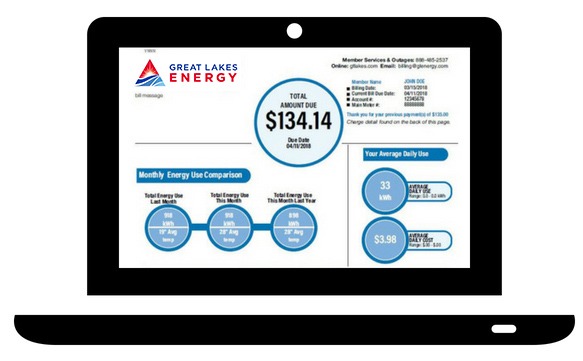
Energy Sources
What is GLE’s SOURCE OF POWER?
GLE purchases all of its power from Wolverine Power Cooperative in Cadillac, MI. Wolverine is a generation and transmission (G&T) cooperative owned by several other distribution cooperatives like GLE in Michigan.
How is GLE involved with RENEWABLE ENERGY?
GLE offers renewable energy programs to homeowners and businesses interested in renewable energy as a source of power. In addition, an educational solar power display stands at GLE’s Boyne City headquarters. Live data on display screen showing power being generated by the solar panels can be viewed in the lobby during regular business hours.
GLE Governance
What are the board of director DISTRICTS? How do I know which district I’m in?
Visit our Board of Directors page for more information.
How do I run for the BOARD OF DIRECTORS?
Simply call 888-GTLAKES (888-485-2537) for more information on the qualifications for seeking a position on the Great Lakes Energy board. Board elections via mail-in ballot take place for specific districts each July and August.
Member Benefits
What are CAPITAL CREDITS and how do they work?
Visit the General Information page for more information.
Operations/System Upkeep
Why does GLE need to remove vegetation within its RIGHT-OF-WAY (ROW)?
GLE or its contractors remove vegetation within ROW for two primary reasons:
SAFETY: Vegetation that touches GLE lines can conduct electricity, making it dangerous for people and animals coming in contact. Also, if lines are down, they can be difficult to see in overgrown areas, which is also dangerous.
RELIABILITY: Vegetation-free ROW access means lineworkers can more quickly and safely make their way to lines and equipment that need repair or replacement.
How does GLE notify members of HERBICIDE APPLICATION being planned?
The herbicide contractor directly notifies each property owner before any work commences to obtain the owner’s permission to apply herbicide. Visit the General Information page for more information.
Why can’t I attach things to ELECTRICAL POLES?
Protruding objects like nails and staples can rip protective gloves, putting lineworkers who have to climb the poles at risk of being electrocuted. Lineworkers may not see a birdhouse, plant hanger or other object on the pole, either, causing them to slip and fall. Thank you for helping keep our workers safe!
Why doesn’t GLE install more UNDERGROUND LINES?
On average, it costs about five times as much to install underground as overhead. Also, maintaining underground lines can be more challenging, and underground lines have a shorter lifespan than overhead lines.
What is GLE’s SOURCE OF POWER?
GLE purchases all of its power from Wolverine Power Cooperative in Cadillac, MI. Wolverine is a generation and transmission (G&T) cooperative owned by several other distribution cooperatives like GLE in Michigan.
RF Meter Upgrades
What type of technology does the meter use and why are they needed?
The new meters being installed utilize radio frequency (RF) technology vs. the existing meters that use powerline carrier technology (PLC). The existing meters are close to 20 years old and utilize old technology.
The RF meters will provide more capabilities for GLE and our members to analyze their electric usage and then make decisions to modify their usage habits. These decisions can impact bills and allow us to offer different rate structures that may incentivize these decisions.
Benefits of the new meters also include:
- Accurate 30-day billing cycles every month (including seasonal accounts).
- Automatic outage notification. You no longer need to let us know if the power is out.
- Elimination of false outage calls. No more unnecessary truck rolls.
- Alarms for high/low voltage and other abnormalities, meaning situations are resolved faster.
- Hourly billing data is available through your online account.
- High-temperature warnings that can reduce chances of meter base damage.
Is the communication method used by the new meters safe?
Yes! In everyday life, people are continuously exposed to very low levels of natural and man-made radio frequency (RF) fields. Even the earth’s surface and the human body are constant sources of RF fields. RF exposures from digital meters are much lower than many other RF sources. For example, natural RF from the human body is 20 times greater, a Wi-Fi signal is 67 times greater, and a cell phone held to your ear is 12,677 times greater!
At 20 inches in front of a meter, the average exposure to radio frequency signals is less than the background RF signals naturally generated by the earth and less than one-seven-thousandth of the safe exposure standard set by the Federal Communications Commission (FCC). Exposure to RF is significantly reduced by buildings. At one yard in front of the meter on a typical day, inside your home, your exposure is minuscule — more than 1.3 million times below the FCC safety standard.
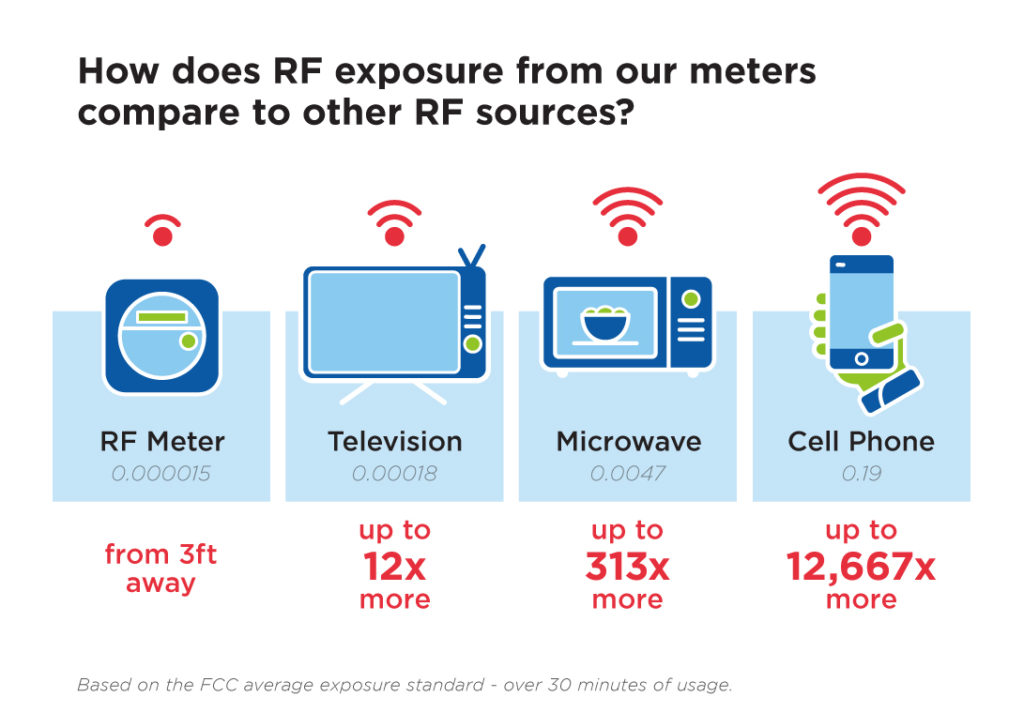
Fact or Fiction: Smart Meter RF Emissions
How often does the RF meter send data?
Data is recorded every 15 minutes and sent on an hourly basis. Our RF meters emit power for less than one minute per day. Unlike cellular devices that signal quite frequently, these meters only transmit RF signals 1% of the time, in quick, short bursts.
In select cases, the meters could transmit RF signals for an extended period during a “maintenance mode,” in which the RF meter is updating information and can be transmitting RF signals for up to an hour. In these rare cases, RF levels still pale in comparison to a standard cell phone pinging continuously throughout the day.
What is done with the data?
GLE is not collecting any data beyond energy use information that helps with outage management, service improvement, rates, or troubleshooting issues. Specifically, the meters record time of use, load profile data, and power-quality information. We would never sell member information.
Is my data transmitted securely?
Yes. Meter data is encrypted using Advanced Encryption Standard (AES) 256 before transmitting. AES-256, which has a key length of 256 bits, supports the largest bit size and is practically unbreakable by brute force based on current computing power, making it the strongest encryption standard. It is the first and only publicly accessible cipher approved by the US National Security Agency for protecting top secret information.
Are these meters more likely to cause damage to my home?
The RF meters we selected for replacement are capable of automatic shutoff functionality that is designed to enhance the protection of your home. Advanced temperature monitoring enables the meter to disconnect power to the home whenever abnormal thresholds are observed. These features create an added layer of safety not present in our older meters.
Will these RF meters be used to learn how to charge more money from us?
On the contrary, data gleaned from these meters will help us to eventually provide even more opportunities for savings for our members. For instance, hourly usage data could help us to create time of use models that would eventually provide our members the flexibility to plan electrical usage during non-peak windows at a reduced rate.
Can I opt-out of the meter upgrade?
Yes. Call 888-485-2537 to speak with a member service representative and ask them to assist in opting out of the meter upgrade. Members who opt-out will be charged a one-time fee of $150 and, after that, a $50 monthly fee to maintain the use of a non-communicating meter.
Why are there extra costs associated with use of the opt-out, non-standard meter?
Without the ability to remotely obtain usage data from your meter, a tech will need to arrange a physical visit on a monthly basis to record usage rates for billing purposes.
Does opting out prevent me from participation in any other services?
Yes. Only members with the new RF meters will be able to take advantage of:
- Accurate 30-day billing cycles every month (including seasonal accounts).
- Automatic outage notification. You no longer need to let us know if the lights are out.
- Elimination of false outage calls. No more unnecessary truck rolls.
- Alarms for high/low voltage and other abnormalities, meaning situations are resolved faster.
- Hourly billing data is available through your online account.
- High-temperature warnings that can reduce the chances of meter base damage.
GLE 2024 Workplan Easements
Do I receive any financial compensation for signing an easement for a workplan?
As a gesture of goodwill, if you complete and return the easement within 15 days of receiving it, you will receive a $25 credit on your bill.
If you do not have an account, you will receive a $25 Amazon gift card.
These incentives are not intended for easements related to new construction.
What does a blanket easement entail?
A blanket easement is a simple way for Great Lakes Energy to gain rights to your property, for an intended purpose. You still own the property and retain the rights to use and enjoy it, subject to the easement rights. We do not intend to use your property outside of the scope of our workplan necessities.
In the future, can you use the easement for other utility work?
Yes, the easement will remain on file and could be used for additional utility work.
What are the benefits of Great Lakes Energy updating the utility infrastructure?
Updating and maintaining our electrical and communication infrastructure is a critical need for Great Lakes Energy, and our co-op members. The benefits often include increased reliability in service, quicker outage response time, and planning for future infrastructure needs, including Truestream fiber internet infrastructure work.
What are the benefits of signing an easement?
Signing the easement in a timely manner allows us to update the utility infrastructure in your area. Whether you live at the location full time or plan to build your dream home someday, we want to provide reliable service you can count on. Reliable, updated utility infrastructure on your vacant land can increase the property value, as well.
How do I fill out an easement and have it notarized?
Please fill in the date and sign your name exactly as written on the easement in the presence of a notary. We offer virtual notary services, free of charge, to assist in this process. To schedule a notary appointment with Great Lakes Energy, please call 1-888-485-2537 ext. 8930, M-F 8 a.m. until 4:30 p.m. or email [email protected].
If you have any questions, please contact us at 1-888-485-2537 ext. 8930 M-F 8 a.m. until 4:30 p.m., or email [email protected].
At this time, virtual notary services are dedicated to GLE work plan efforts and not yet available for new construction.
Can you adjust the scope of work included in the planned infrastructure updates?
We strive to prepare and plan the infrastructure updates to meet the needs of a majority of the Great Lakes Energy members involved in the most economical, least invasive way possible. If you would like to discuss your specific needs in regard to your property, trees, and equipment placement, please reach out by email at [email protected] or by calling 1-888-485-2537 ext. 8930 M-F 8 a.m. until 4:30 p.m.
Why didn’t my neighbor have to sign an easement?
Great Lakes Energy has many easements on file already. Your neighbor likely signed an easement for a different project, and we have that on file.
Can a different easement type be used?
We’re happy to discuss options specific to you and your location. Please reach out by email at [email protected] or by calling 1-888-485-2537 ext. 8930 M-F 8 a.m. until 4:30 p.m.
Where can I take my easement to be notarized?
We offer the convenience of free virtual notary services, as well as a notary in each Great Lakes Energy office. To schedule a notary appointment with Great Lakes Energy, please call 1-888-485-2537 ext. 8930, M-F 8 a.m. until 4:30 p.m. or email at [email protected].
What do all the markings on the workplan map mean?
Items you may see on the workplan map for your area include:
